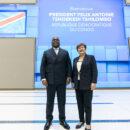“African economies must diversify and stimulate industrial development” – interview with Richard Kozul-Wright, United Nations Commission on Trade and Development


Richard-Kozul Wright is head of UNCTAD’s Unit on Economic Integration and Cooperation Among Developing Countries.
“The export-your-way-to-prosperity model is dead – didn’t work in the boom years prior to 2007…and won’t work now.” So says a rather combative press release from the United Nations Commission of Trade and Development’s (UNCTAD) annual Trade and Development report.
Richard Kozul-Wright, head of UNCTAD’s Unit on Economic Integration and Cooperation Among Developing Countries, appears slightly more nuanced in his analysis, but the thrust is similar:
“The big challenge for primary exporters [including most African countries] is whether they can use the rents they have gained from rising commodities prices in a way that at least begins a diversification process.”
The “˜Africa Rising’ narrative, which we hear so much of at present, is largely based on African countries feeding industry in Asia with raw materials to produce goods for final sale in the US and EU.
Kozul-Wright, however, argues that this will not cut it for African countries eager to drastically grow and diversify their economies. “We are slightly manufacturing fundamentalists” he says, so in UNCTAD’s analysis “they’ve got to find some way to do it [manufacturing].” This will have to start by building up the supply capacity in relatively unsophisticated manufacturing activities.
The current “˜commodities supercycle’ will not last forever. The expectation is that prices, which have come down significantly since their high point of 08/09, will not rise significantly again. The big question in this regard is whether commodities producers have become weaned on rising prices as part of their growth model. If they have, then a drop in prices will be problematic. Consequently, there is need to create greater domestic demand and provide “much-needed ballast” to make countries less vulnerable to shifts in the global economy.
Looking at specific African countries, Kozul-Wright has praise for Ethiopia which he says is gaining a lot of, perhaps deserved, attention. But the African countries which could realistically have become dynamic regional hubs – Nigeria, Kenya, and Zimbabwe, for example – have not made the progress their potential suggested.
Brics countries, particularly China, have done some positive things in the last decade, but much of the growth in these countries is dependent on external capital markets. Decoupling from western capital markets, apart from China, is largely a myth.
Africa (and the rest of the Global South) does not benefit when the North is growing slowly. To this end, UNCTAD would like to see a rejection of “˜austerity economics’. All you get when the global north struggles economically is “a poor form of convergence.”
UNCTAD is most disappointed that there has been no proper reform of the international financial system and we still live in a world where highly speculative short-term financial flows dominate the movement of capital. The threat from this remains as great as ever and the failure to reform international financial architecture, which is the responsibility of rich countries, remains a problem for the developing world.
Kozul-Wright calls for “a return to some of the unfashionable methods of the past.” For example, industrial policy and development banks.
African policy-makers are aware that listening to the World Bank for the last 25 years has not served them well. What’s changed is that they can now turn to other countries in the global South rather than The Bank or the OECD for lessons and, particularly in the case of China, loans.
Says Kozul-Wright, “African policy-makers went through structural adjustment, that didn’t work, so they are more willing to listen to…heterodox solutions…development banks, for example.” In this regard, the newly proposed Brics Development Bank could be “something of a game-changer”.
Interview by Magnus Taylor – Editor, African Arguments.






